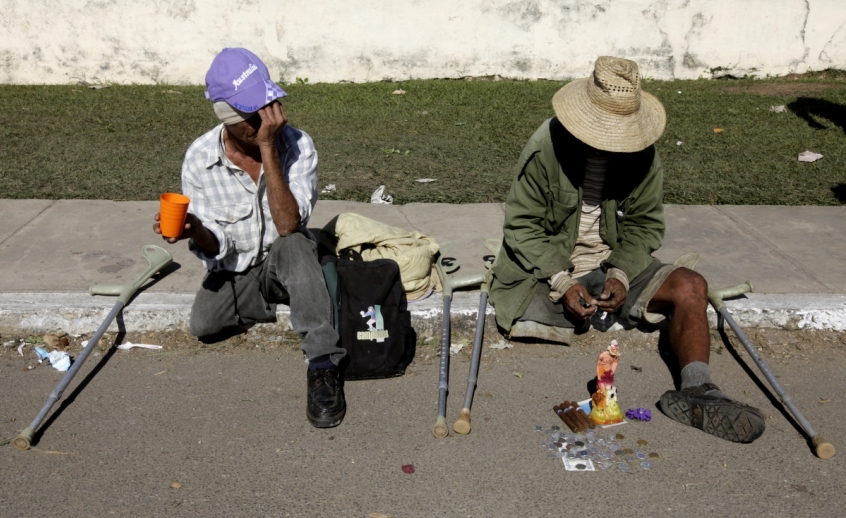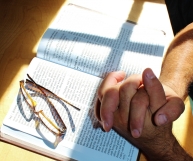
In Luke 17:11-19 there's a moving story about Jesus healing 10 lepers. Unlike many such stories, it isn't the healing that's the point of the story, but what happened around it. It's a multi-layered tale of an encounter with God's power and mercy that has much to say to us today.
The men with leprosy were social outcasts, as well as being ill. They did not necessarily have what we know as leprosy today, though they might well have done as it was endemic in the region. The term was also used for other kinds of skin conditions (the diagnosis is outlined in Leviticus 13). But socially, the effect was the same: they were outcasts from their communities who had gathered together for personal safety and to combat their isolation. Stigma is still a huge issue today, and there are Christian organisations like The Leprosy Mission working to overcome it. In the case of these 10 men, they didn't even dare to approach Jesus to ask for his help, but "stood at a distance" and called for him to have pity on them (verse 13).
Leprosy proper (Hansen's disease) did not get better, though today it can be cured through powerful drugs. However, other skin conditions did improve. When someone believed they were cured, they had to go to a priest, who would examine them and certify the healing. Jesus tells them to do so, and "as they went, they were cleansed".
In the story, there are three things that speak to us.
First, Jesus told the men to show themselves to a priest while they still had leprosy. It was as they went that they were cured. That meant believing against the evidence and trusting God even when they didn't really have grounds to do so. As they went, the evidence changed.
That's almost a definition of faith – trusting in what we cannot prove. In Hebrews 11:1 it's described as "the substance of things hoped for, the evidence of things not seen". If we want everything plain and clear before we take a step of faith, it's not really faith. Faith is trust, even when we don't understand and even when the evidence is against us. It's trust that God will make it right. In the story, only one of the 10 comes back to thank Jesus. But all of them had a huge faith in God.
Second, the one who comes back is a Samaritan. Samaritans were hereditary enemies of Jews, for various reasons. So why was he the one to come back, rather than the Jews? Perhaps it was because he had a deeper sense of what had been done for him. If a Jewish miracle-worker healed Jews it was wonderful, but so he should. For him to heal a Samaritan was going above and beyond the call of duty. It was entirely unmerited grace and favour. If you don't believe you deserve to be saved and God saves you anyway, you will be deeply, deeply grateful.
Christians who've been going to church for years and years probably think of themselves as good people. We have probably put time, effort and money into being a Christian. We might well have given things up that we might have enjoyed doing. And with all of this comes a sense of entitlement: in some way we deserve to be blessed by God. But this story reminds us that it's those who are most conscious of what's been done for them that are closest to the heart of God.
Third, it speaks of God's grace to everyone. The men's healing doesn't depend on them coming back to say thanks. Jesus heals them anyway; it's not as if the healing of the other nine would be miraculously withdrawn because they didn't return.
God does lots of good things for everyone, whether they acknowledge it or not. He makes the sun shine on the righteous and unrighteous and the rain fall on the just and the unjust (Matthew 5:45). There are many people who are not Christians, but who are still blessed. At one level, Christians ought just to be the people who acknowledge what God's done for them, and turn back to say "Thank you." There is a "common grace" God gives to everyone. Whether we are Christians or not, we can take pleasure in beauty, in family, in creation and work, in love and in friendship. These gifts are unconditional; they don't depend on us acknowledging God as our saviour, though they may be enriched by it.
It's estimated that one in 10 of the UK population goes to church regularly. One leper in 10 returned to thank Jesus for saving him. That's what Christians do.
There's an old song that says, "Count your blessings, name them one by one, and it will surprise you what the Lord has done." Above all, this is a story that teaches us to be thankful.
Follow Mark Woods on Twitter: @RevMarkWoods

















